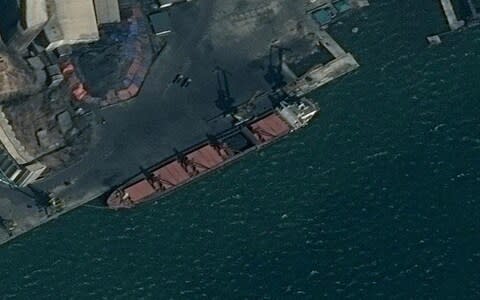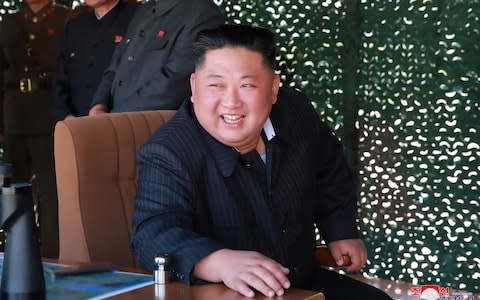North Korea launches two ballistic missiles amid stalled talks with US

North Korea fired two short-range ballistic missiles on Thursday, in its second weapons test in less than a week, South Korea’s military said.
One missile travelled 260 miles and the other 170 miles in an easterly direction after being launched from a site northwest of the North’s capital, Pyongyang, the South’s joint chiefs of staff confirmed in a statement.
The launch marks an escalation from a test just five days ago of long-range multiple rocket launchers and another short-range ballistic missile resembling a Russian 9K720 Iskander.
North Korea's state-run media said leader Kim Jong-un helped guide the firing of the missiles. The Korean Central News Agency said that "at the command post Supreme Leader Kim Jong-un learned about a plan of the strike drill of various long-range strike means and gave an order of start of the drill".
Donald Trump said he was not happy about North Korea's recent military tests. The US President told reporters at the White House on Thursday that "we're looking" at the situation "very seriously right now."
He said the weapons were smaller, short-range missiles, but added: "Nobody's happy about it."
Mr Trump, who has met with Kim twice now, said: "I don't think they're ready to negotiate."

The military at first said they were launched from Sino-ri, home to a North Korean ballistic missile base. But it later confirmed that the launchpad was Kusong, a town north of Sino-ri, which has been linked in the past with the North’s first solid-fuel midrange ballistic missile, the Pukguksong-2.
The latest tests coincided with the arrival of Stephen Biegun, the US envoy for North Korea, in Seoul to meet with South Korean officials to explore ways to resume stalled talks over the North’s nuclear weapons programme.
A few hours after the confirmation of the missile launch, the US justice department announced that it had for the first time seized a North Korean shipping vessel that had been violating American law and international sanctions.
Prosecutors said the carrier ship, the Wise Honest, was being used to export North Korean coal, a vital component of the country's economy that is under debilitating sanctions.

The ship was first impounded by Indonesia last April and the justice department obtained a seizure warrant in July. Officials said the timing of the complaint for forfeiture was not linked to recent strains between the two countries.
However, analysts believe the resumption of North Korean missile tests could herald a gradual escalation of tensions between Washington and Pyongyang after last year's diplomatic detente.
On Wednesday, the North said that last weekend’s “strike drill” was “regular and self-defensive” and had “neither targeted anyone nor led to an aggravation of the situation in the region.”
The tests come just months after a failed second summit in February in Hanoi between the North’s leader, Kim Jong-un, and Donald Trump, the US president.
Kim had hoped to win relief from punishing sanctions in return for a partial dismantlement of his country’s nuclear weapons programme, but the meeting ended without a deal and negotiations have since come to a standstill.

Experts believe that Pyongyang is using the military tests to raise pressure on Washington to reignite talks, and to reassert Kim’s strength to the North Korean public which is facing increasing economic hardships and food shortages.
Last month Kim issued a year-end ultimatum to resolve differences with the US over nuclear disarmament. Analysts say that recent tests are an indication that Kim is losing patience with Washington but that the window for negotiations is not yet closed.
“Pyongyang is getting frustrated with the lack of concessions on the part of the US, as well as slow US-ROK [South Korea] dialogue. The North does not want to play an endless waiting game with a divided US administration that cannot achieve common goals with Seoul,” said Edward Howell, a North Korea expert at Oxford University.
“Pyongyang wants concrete commitments to sanctions relief, and a realisation from Washington that no matter how much the US pushes for denuclearisation on US terms, Pyongyang will not comply,” he added.
“Put simply, it wants the world to listen to its demands. If not, it has nuclear and missile capability after all.”

Saturday’s drill was the first test of a ballistic missile by North Korea since November 2017. However, it did not violate Kim’s self-imposed nuclear and missile-testing moratorium, which only applied to intercontinental-range ballistic missiles capable of striking the United States.
The significance of the drill was played down by Washington. President Trump voiced confidence at the weekend that Kim would not “break his promise” or do anything to interfere with North Korea’s economic potential. “Deal will happen!” he tweeted.
By contrast, a statement from South Korea's presidential Blue House said it was "greatly concerned” at the resumption of tests, calling them a violation of a military agreement signed by both Koreas last year to completely cease “all hostile acts”.
The presidential office said on Thursday that it was keeping “close tabs” on the current security situation.
During an interview with the KBS news channel, Moon Jae-in, the South Korean president, said it was premature to conclude whether Pyongyang had violated UN Security Council resolutions prohibiting it from using ballistic missile technology.
He said the North appeared to be demonstrating its displeasure with the breakdown of the Hanoi summit.
But he indicated that plans for possible food aid to the South’s impoverished neighbour were still on track.
The Japanese ministry of defence confirmed that the missiles had not landed in its territorial waters. "At the moment, we don't see any situation that would immediately impact on Japan's security," it said in a statement.



